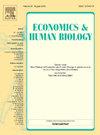Does early-life famine exposure lead to healthy later-life dietary behavior: Evidence from the great Chinese famine
IF 1.8
3区 医学
Q2 ECONOMICS
引用次数: 0
Abstract
This paper investigates the long-run effect of early-life exposure to famine on survivors’ dietary behavior. By exploiting exogenous variations in local severity of the Great Chinese Famine and variations of different cohorts, we conduct a difference-in-differences analysis. Based on detailed three-day food intake records from the China Health and Nutrition Survey, we find that famine exposure led the famine cohort who was conceived or born during the famine to adopt healthier dietary behaviors, as evidenced by a higher healthy eating score and a healthier dietary composition. Additionally, the pre-famine cohort exposed to the famine at ages 9–12 in late childhood exhibited a healthier food composition, characterized by a higher share of aquatic products. However, no statistically significant effects were observed for the pre-famine cohorts that experienced the famine in early and middle childhood. The results remain robust across various sensitivity checks. We propose that early-life famine exposure influences dietary behavior through mechanisms such as awareness of healthy eating, diet knowledge and risk aversion.
早年遭受饥荒是否会导致晚年健康的饮食行为?来自中国大饥荒的证据。
本文研究了早年遭受饥荒对幸存者饮食行为的长期影响。通过利用中国大饥荒当地严重程度的外生差异和不同队列的差异,我们进行了差异分析。根据中国健康与营养调查的三天食物摄入量详细记录,我们发现饥荒导致在饥荒期间怀孕或出生的饥荒人群采取了更健康的饮食行为,这表现在更高的健康饮食评分和更健康的饮食结构。此外,9-12 岁儿童晚期遭受饥荒的饥荒前队列表现出更健康的食物构成,其特点是水产品的比例更高。然而,对于在儿童早期和中期经历过饥荒的饥荒前人群来说,在统计上没有观察到明显的影响。通过各种敏感性检验,结果仍然是稳健的。我们认为,幼年时期的饥荒经历会通过健康饮食意识、饮食知识和风险规避等机制影响饮食行为。
本文章由计算机程序翻译,如有差异,请以英文原文为准。
求助全文
约1分钟内获得全文
求助全文
来源期刊

Economics & Human Biology
医学-公共卫生、环境卫生与职业卫生
CiteScore
4.50
自引率
12.00%
发文量
85
审稿时长
61 days
期刊介绍:
Economics and Human Biology is devoted to the exploration of the effect of socio-economic processes on human beings as biological organisms. Research covered in this (quarterly) interdisciplinary journal is not bound by temporal or geographic limitations.
 求助内容:
求助内容: 应助结果提醒方式:
应助结果提醒方式:


